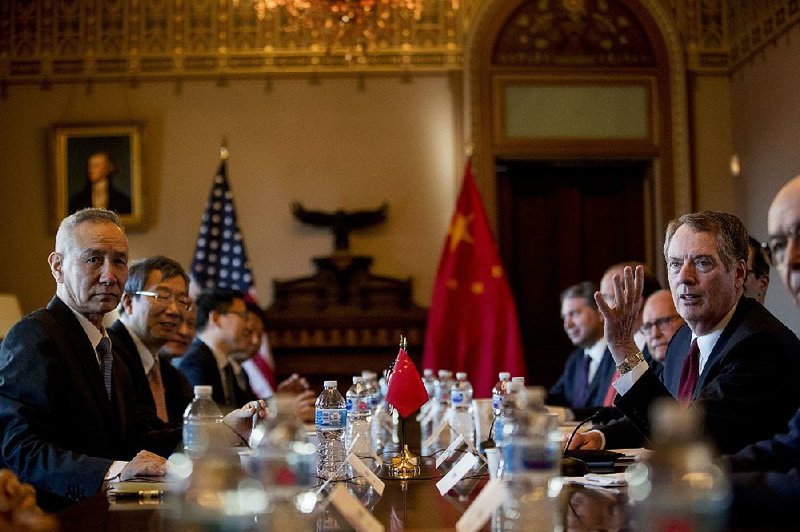WASHINGTON -- U.S. and Chinese negotiators are holding high-level talks aimed at settling a six-month trade war that has weakened both sides, shaken financial markets and clouded the outlook for the global economy.
Yet the odds seem stacked against any substantive resolution this week to the standoff between the world's two biggest economies. Perhaps the best that might be hoped for, analysts say, is for the two sides to agree to keep talking.
As the U.S. and Chinese delegations met Wednesday for the start of two days of talks, U.S. Trade Representative Robert Lighthizer welcomed a Chinese team led by Vice Premier Liu He. Lighthizer bantered lightheartedly about last year's dinner meeting between Presidents Donald Trump and Xi Jinping in Buenos Aires, Argentina.
The differences between Beijing and Washington are vast. The United States is essentially demanding that China downsize its economic aspiration to become a world leader in such fields as robotics and electric cars.
"A comprehensive deal that fundamentally changes their system -- I don't think that's possible," said Christopher Adams, a former U.S. trade official specializing in China and now a senior adviser at the law firm Covington.
A new complication injected itself into U.S.-China relations this week when the Justice Department lodged criminal charges Monday against the Chinese tech giant Huawei, accusing it of stealing technology secrets and violating sanctions against Iran. Beijing shot back by demanding that the Trump administration pull back from what it called an "unreasonable crackdown" on the Chinese maker of smartphones and telecom gear.
"We are anticipating no big outcomes this week," said Erin Ennis, senior vice president at the U.S.-China Business Council.
A deadline looms. On March 2, the Trump administration is scheduled to escalate its tariffs on $200 billion worth of Chinese imports from 10 percent to 25 percent.
The American delegation to this week's talks is led by Lighthizer, a longtime critic of aggressive Chinese trade practices and of U.S. policies that failed to blunt them.
The core of the U.S. allegations against China is that the country systematically steals trade secrets, forces foreign companies to hand over technology as the price of access to the Chinese market and subsidizes its own tech companies.
"The idea of just grabbing [technology] however they can is kind of ingrained at this point," said Amanda DeBusk, chairman of the international trade practice at Dechert LLP and a former Commerce Department official. "You can't just flip a switch" and expect China to drop long-established practices.
The administration has imposed tariffs on $250 billion in Chinese imports; China has retaliated with import taxes on $110 billion in U.S. goods.
Trump has threatened to extend the tariffs to an additional $267 billion in Chinese goods. If he did, Trump's import taxes would cover virtually everything China ships to the United States.
Last spring, it looked as if the two sides might avoid a full-blown conflict. Treasury Secretary Steven Mnuchin declared the trade war "on hold" after China had agreed to step up its purchases of U.S. goods, especially in agriculture and energy, and narrow America's huge trade deficit with China. The cease-fire didn't last. Critics dismissed China's commitments as vague, and Trump backed away from Mnuchin's deal and decided to proceed with tariffs.
The trade war has magnified uncertainties for businesses, raised priced in some sectors and unsettled investors. Pointing to the U.S.-China conflict, economists at the International Monetary Fund, the World Bank and the Organization for Economic Cooperation and Development have downgraded their forecasts for global growth. The Dow Jones industrial average is down more than 8 percent since early October, though it has rebounded since Christmas.
The Chinese economy is decelerating, having expanded last year at its slowest pace since 1990. U.S. officials and some analysts say they believe its weakening economy will pressure the Chinese into making concessions.
But she added that "the Chinese slowdown also impacts the United States." Indeed, the U.S.' Caterpillar reported Monday that its heavy-equipment sales in China sales were slowing -- news that sent its stock price tumbling.
The Justice Department's decision to charge Huawei, meanwhile, "has thrown a curveball" into the talks, said Patrick Chovanec, chief strategist at Silvercrest Asset Management Group.
Meanwhile, an Apple Inc. hardware engineer has been charged by the U.S. with stealing the iPhone maker's driverless-car secrets for a Chinese company, the second such case since July during an unprecedented crackdown by the Trump administration on Chinese corporate espionage.
Jizhong Chen was seen by a fellow Apple employee taking photographs Jan. 11 with a wide-angle lens inside a secure work space that houses the company's autonomous-car project, about six months after he signed a strict confidentiality oath when he was hired, according to a criminal complaint in federal court in San Jose, Calif.
Apple said disclosure of the data taken by Chen would be "enormously damaging," according to prosecutors. Among the photos seized by the government: an image stamped Dec. 19 diagramming Apple's autonomous-driving architecture. Another from June depicts an assembly drawing of a wire harness for an autonomous vehicle.
Information for this article was contributed by Paul Wiseman, Christopher Rugaber and Darlene Superville of The Associated Press and by Kartikay Mehrotra and Mark Gurman of Bloomberg News.
Business on 01/31/2019
